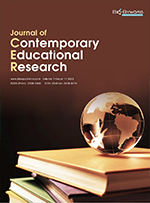Abstract
This paper explores the influences on women’s upbringing and their educational significance by using the character Estella from Great Expectations as a case study. Through analyzing the impact of social environment, family education, and self-awakening, this article aims to promote gender equality and the construction of a feminist cognitive community. It delves into the class divisions of 19th-century England, the manipulative family education imposed on Estella by Miss Havisham, and Estella’s journey towards self-consciousness after her foster mother’s death. The study highlights the challenges faced by women in societal constraints, family expectations, and the importance of self-discovery in overcoming these limitations.
References
George T, Mielicki MK, Wiley J, 2023, Great Expectations: Misleading Effects of Images in the Alternate Uses Task. Psychology of Aesthetics, Creativity, and the Arts, 17(1): 56–67. http://doi.org/10.1037/aca0000380
Tsai N, Buschkuehl M, Kamarsu S, et al., 2018, (Un)great Expectations: The Role of Placebo Effects in Cognitive Training. Journal of Applied Research in Memory and Cognition, 7(4): 564–573. http://doi.org/10.1037/h0101826
Barlow M, Woodman T, Hardy L, 2013, Great Expectations: Different High-Risk Activities Satisfy Different Motives. Journal of Personality and Social Psychology, 105(3): 458–475. http://doi.org/10.1037/a0033542
Shea CM, Malone MFT, Griffith JA, et al., 2023, Please Feel Free to Intervene: A Longitudinal Analysis of the Consequences of Bystander Behavioral Expectations. Journal of Diversity in Higher Education, 16(4): 486–496. http://doi.org/10.1037/dhe0000348
Hutchison KA, Neely JH, Johnson JD, 2001, With Great Expectations, Can Two “Wrongs” Prime A “Right”? Journal of Experimental Psychology: Learning, Memory, and Cognition, 27(6): 1451–1463. http://doi.org/10.1037/0278-7393.27.6.1451
Vertsberger D, Knafo-Noam A, 2019, Mothers’ and Fathers’ Parenting and Longitudinal Associations with Children’s Observed Distress to Limitations: From Pregnancy to Toddlerhood. Developmental Psychology, 55(1): 123–134. http://doi.org/10.1037/dev0000622
Henning G, Ehrlich U, Gow AJ, et al., 2023, Longitudinal Associations of Volunteering, Grandparenting, and Family Care with Processing Speed: A Gender Perspective on Prosocial Activity and Cognitive Aging in the Second Half of Life. Psychology and Aging. http://doi.org/10.1037/pag0000780
Affleck MK, Steed LG, 2001, Expectations and Experiences of Participants in Ongoing Adoption Reunion Relationships: A Qualitative Study. American Journal of Orthopsychiatry, 71(1): 38–48. http://doi.org/10.1037/0002-9432.71.1.38
Priniski SJ, Rosenzweig EQ, Canning EA, et al., 2019, The Benefits of Combining Value for the Self and Others in Utility-Value Interventions. Journal of Educational Psychology, 111(8): 1478–1497. http://doi.org/10.1037/edu0000343
Wolf W, 2023, ‘Writing Facts’ and 19th-Century English Realist Fiction: Theoretical Reflections and the Com-plexity of the Relationship in Charles Dickens’ Hard Times, and George Eliots’ Adam Bede, in Writing Facts: Interdisciplinary Discussions of a Key Concept in Modernity, Transcript Publishing, Bielefeld, Germany, 163–190.
MacMillan LN, 2022, The Afterlife of Charles Dickens: His Posthumous Impact on Nineteenth-Century Spiritualism. Dickens Studies Annual: Essays on Victorian Fiction, 53(2): 271–282.
Buckland A, 2021, Charles Dickens, Man of Science. Victorian Literature and Culture, 49(3): 423–455.
